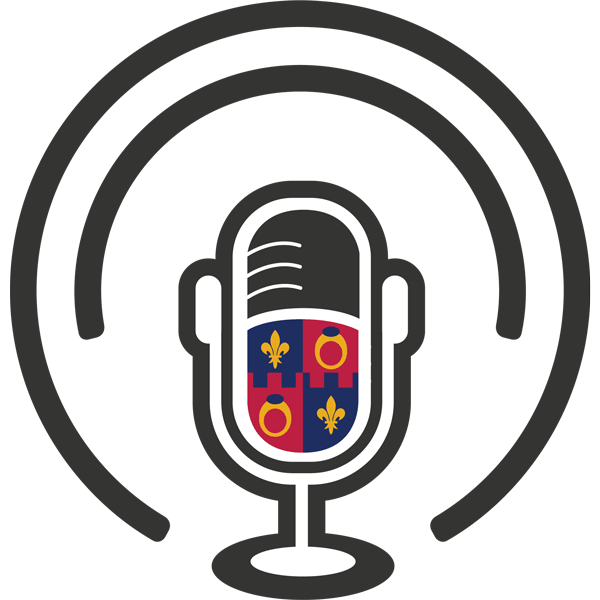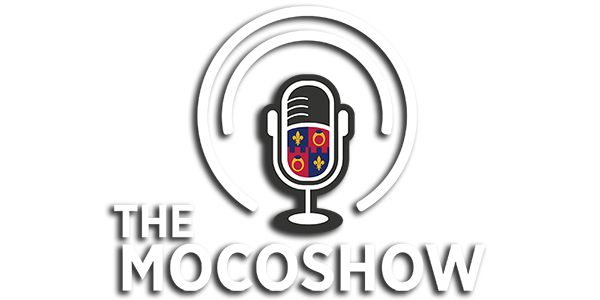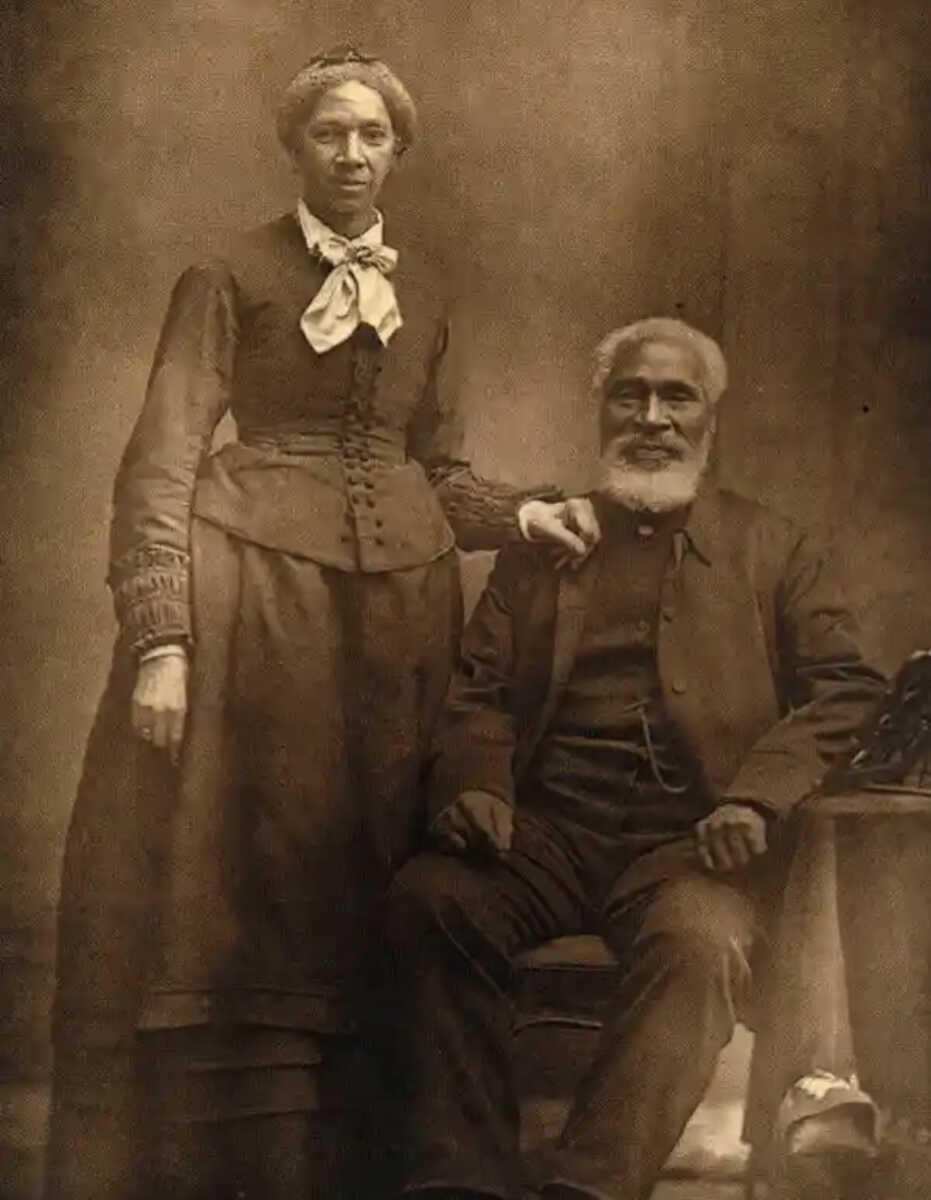
Street to be renamed Josiah Henson Parkway runs through land where Henson was enslaved; Henson led over 100 people to freedom as a conductor of the Underground Railroad.
More on Josiah Henson here.
Per Montgomery Planning:
Wheaton, MD –The Montgomery County Planning Board, part of The Maryland-National Capital Park and Planning Commission (M-NCPPC), approved a resolution during its meeting on February 24 to rename Montrose Parkway, located in North Bethesda, in honor of the Rev. Josiah Henson. The street to be renamed Josiah Henson Parkway runs through the former plantation property of Isaac Riley, where Henson was enslaved. This property is also home to the Josiah Henson Museum and Park, operated by Montgomery Parks.
Henson, a renowned international speaker and abolitionist, led 118 people from enslavement in the United States to freedom in Canada as a conductor of the Underground Railroad. His autobiography, which depicted his time enslaved on the Riley plantation until he escaped to Canada in 1830, inspired Harriet Beecher Stowe’s landmark novel, “Uncle Tom’s Cabin.” The record-breaking book fueled the abolitionist movement in the mid-nineteenth century and helped to propel the American Civil War.
“We are proud to commemorate the Rev. Josiah Henson’s contributions to end slavery with this new street name,” said Montgomery Planning Director Gwen Wright. “We hope that everyone who travels on Josiah Henson Parkway will take a moment to think about how their lives may have been different if it were not for his bravery and perseverance.”
The request to rename Montrose Parkway came from Councilmember Hans Riemer, who sent a letter to Director Wright on January 5 after working collaboratively with community leaders, including Catherine Leggett, Campaign Chair of the Henson Museum Project, the Josiah Henson Museum and Park Advisory Committee, and Warren Fleming, an early advocate of Henson’s legacy.
“It is important that we provide the Rev. Josiah Henson with the public recognition he justifiably deserves, and this new street name is a great step forward,” said Councilmember Riemer. “It will give our residents and children a symbol of the fight for freedom that Henson embodies while reminding our community of our unique history and the role of African American leaders since our founding. I am honored to help make Josiah Henson Parkway a reality in partnership with community leaders, Montgomery Planning and the Montgomery County Department of Transportation.”
M-NCPPC is the sole entity authorized under Maryland law with street addressing or renaming streets in Montgomery County, except within certain independent municipalities. The Montgomery County Planning Board has sole approval authority over street renaming, which it has delegated to the Montgomery Planning Director.
After conducting an analysis, Montgomery Planning determined that this renaming is an appropriate way to commemorate Henson as an historic figure of international significance. It will also have a minimal impact on the two properties currently with Montrose Parkway addresses and will eliminate any possible confusion with Montrose Road, also located in North Bethesda.
This renaming effort is separate from the M-NCPPC Streets and Parks Facilities Renaming Review Project, which focuses on Montgomery County-owned and maintained streets and park facilities named after Confederates or those who otherwise do not reflect Montgomery County’s values. Montgomery Planning has so far renamed three streets under that project identified as having full name matches with Confederate soldiers to honor local African American historical figures Geneva Mason and William Dove.
The Montgomery County Department of Transportation (MCDOT) and the State Highway Administration (SHA) are expected to install the new street signs for Josiah Henson Parkway in early March.
Last April, Montgomery Parks opened the Josiah Henson Museum and Park, a 3.34-acre park located at 11420 Old Georgetown Road in the Luxmanor Community of North Bethesda. The museum and park is dedicated to telling the story of resilience and perseverance in overcoming slavery, based on the detailed words and experiences of Josiah Henson – enslaved in Montgomery County for much of his life.
The Josiah Henson Museum and Park tells the inspirational life story of Reverend Josiah Henson, who was born into slavery yet defied the odds to become an influential author, abolitionist, minister, public speaker, and a world-renowned figure. One of Henson’s many accomplishments was his 1849 autobiography, The Life of Josiah Henson, Formerly a Slave, Now an Inhabitant of Canada, which inspired Harriet Beecher Stowe’s landmark anti-slavery novel, Uncle Tom’s Cabin.
Who is Josiah Henson?
Josiah Henson was born on a farm near Port Tobacco, Charles County, Maryland, on a plantation owned by Francis Newman, in June of 1789. His father was enslaved by Francis Newman whereas Josiah Henson, his mother, and his siblings were enslaved by Dr. Josiah McPherson.
When Henson was a young boy, his father was punished for standing up to an overseer of enslaved people. He received a hundred lashes, and his right ear was nailed to the whipping post and then cut off. His father was sold away to Alabama. Josiah also experienced hardships and sufferings at the hands of his masters as well, including having his arms broken and several other injuries.
Following his family’s enslaver’s death, young Josiah was separated from his mother, brothers, and sisters. Henson’s siblings were sold first via auction. His mother was bought by Issac Riley of Montgomery County and when she pleaded to her new enslaver to purchase Josiah Henson, Riley responded by hitting and kicking her.
Josiah Henson was sold to Adam Robb of Rockville, Montgomery County. Adam Robb encountered Issac Riley and struck a deal, which resulted in Henson being sold to Riley and was reunited with his mother. Josiah Henson became very ill and his mother pleaded with enslaver, Isaac Riley, and Riley agreed to buy back Henson so she could at least have her youngest child with her, on the condition that he would work in the fields.
Henson rose in his enslaver’s esteem, and was eventually entrusted as the supervisor of his Riley’s farm, located in what is now considered North Bethesda in Montgomery County. In 1825, Riley fell onto economic hardship and was sued by a brother-in-law. Desperate, he begged Henson, with tears in his eyes, to promise to help him. Duty bound, Henson agreed. Riley then told him that he needed to take eighteen people which he enslaved to his brother in Kentucky by foot. They arrived in Davies County, Kentucky, in the middle of April 1825 at the plantation of Amos Riley.
In September 1828, Henson returned to Maryland in an attempt to buy his freedom from Issac Riley. He tried to buy his freedom by giving his master $350, which he had saved up, and a note promising a further $100. Riley, however, added an extra zero to the paper and changed the fee to $1,000. Cheated of his money, Henson returned to Kentucky and then escaped to Kent County, Upper Canada, in 1830, after learning that he might be sold again. In the last of these attempts to attain freedom, Amos Riley agreed to give Josiah his freedom in exchange for $300. Josiah raised the money only to find that his enslaver had raised the fee. Soon after, Henson learned that Riley planned to sell him in New Orleans, Louisiana, separating him from his wife and four children. When he found this out, Henson became determined to escape to Canada to gain his freedom. He took his family with him, including his wife and their children to start the new life northward
After convincing his wife to escape with him, Henson’s wife created a knapsack large enough to carry both of their smallest children; the eldest two would accompany his wife. The Henson family left Kentucky, traveling through the night, and sleeping in the woods throughout the day. They crossed into Indiana, then into Cincinnati. As the Henson family was crossing Hull’s Road in Ohio, Josiah’s wife fainted from exhaustion. As they continued on, they encountered Native Americans, and were reinvigorated with food and rest.
After crossing a lake in Ohio, Josiah encountered Captain Burnham, a ship captain, who agreed to transport the Henson family to Buffalo, New York; from there they would cross the river into Canada. Upon setting foot into Canada, Josiah Henson described the ecstatic feelings of liberation by throwing himself onto the ground and rejoicing with his family. On October 28, 1830, Josiah Henson became a liberated man.
Josiah Henson described the living conditions during his time being enslaved in Montgomery County at the turn of the 1800s:
“We lodged in log huts, and on the bare ground. Wooden floors were an unknown luxury. In a single room were huddled, like cattle, ten or a dozen persons, men, women, and chil- dren. All ideas of refinement and decency were, of course, out of the question. We had neither bedsteads, nor furniture of any description. Our beds were collections of straw and old rags, thrown down in the corners and boxed in with boards; a single blanket the only covering. The wind whistled and the rain and snow blew in through the cracks, and the damp earth soaked in the moisture till the floor was miry as a pigsty. Such were our houses. In these wretched hovels were we penned at night, and fed by day; here were the children born and the sick—neglected.”
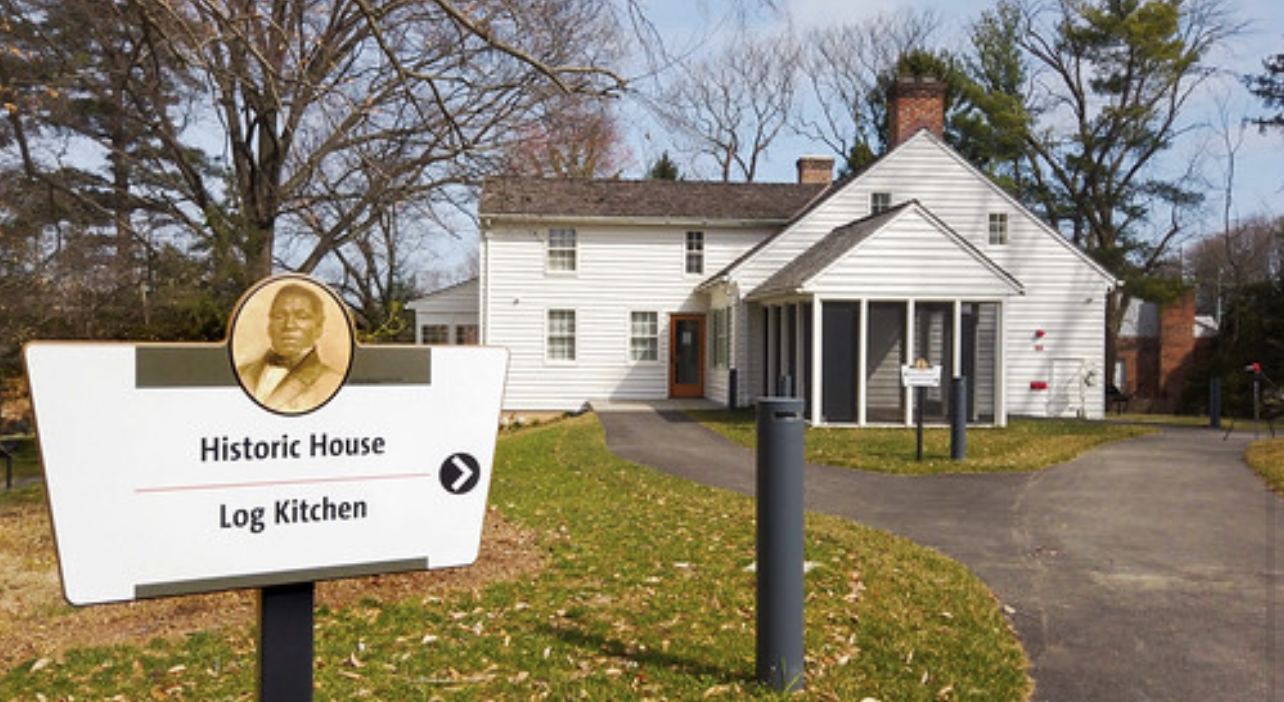
Josiah Henson Museum and Park Opens on April 23
Montgomery Parks has announced the opening of Josiah Henson Museum and Park on April 23, 2021. The museum and park are located at 11410 Old Georgetown Road in North Bethesda, on the site of the former plantation where Henson was enslaved from 1795 – 1830. The museum is open Friday through Sunday, 10 a.m. to 4 p.m. Tickets are required for admission and must be purchased online.
The Josiah Henson Museum and Park tells the inspirational life story of Reverend Josiah Henson, who was born into slavery yet defied the odds to become an influential author, abolitionist, minister, public speaker, and a world-renowned figure. One of Henson’s many accomplishments was his 1849 autobiography, The Life of Josiah Henson, Formerly a Slave, Now an Inhabitant of Canada, which inspired Harriet Beecher Stowe’s landmark anti-slavery novel, Uncle Tom’s Cabin.
“I’m proud that Maryland’s 8th District is home to the new Josiah Henson Museum and Park,” said Congressman Jamie Raskin. “This vivid retelling of the extraordinary life and legacy of Josiah Henson will help us bring to life African-American history in Montgomery County and across Maryland. I thank Montgomery Parks and Montgomery County for researching and uplifting the untold stories of our African-American community, and I look forward to visiting and promoting the museum.”
“Josiah Henson was a remarkable man, and I am thrilled that we can preserve and amplify his legacy through this new museum. The museum is a resource of not only local significance but national importance. It is the only archaeology-based museum in the country dedicated to telling the story of African American enslavement. I encourage everyone to plan a visit,” said Mike Riley, Director, Montgomery Parks.
The Josiah Henson Museum & Park includes:
- The Riley/Bolten House which dates to1800-1815 and its attached log kitchen which dates to 1850. These historic structures have been rehabilitated and now feature both traditional and multimediaexhibits, incorporating archaeological artifacts found onsite.
- A newly constructed 3,000 square-foot visitor center which includes an auditorium with an orientation film, gift shop, restrooms, and observation terrace.
- A 4-acre landscaped park with an accessible walking path featuring outdoor interpretive exhibits, and archaeological features.
Throughout the museum and park, Henson’s story is dramatically recounted through film, audio recordings, archaeological artifacts, graphics, and custom illustrations by artists. The experience transports visitors back in time and evokes moments of emotion and reflection. In addition to interpreting Reverend Henson’s life story, the museum also educates visitors about the history of enslavement in Montgomery County and the ongoing struggles for racial equity and justice.
“Our family is absolutely thrilled with the completion of the museum,” said Mia M. Lewis, a descendent of Josiah Henson. “My hope is that people will come to understand who the Rev. Josiah Henson truly was, a man of tremendous strength, intelligence, loyalty, and of great faith.”
The Josiah Henson Museum and Park is open Friday through Sunday, 10:00 am – 4:00 pm. Tickets are required and can be purchased in advance online. In accordance with COVID-19 health and safety guidelines, admission is limited to your reserved timeslot and masks are required. Visitor parking is available at Wall Local Park, 5900 Executive Blvd., N. Bethesda. There are a limited number of accessible parking spots on-site for permit holders at 11410 Old Georgetown Road.
Josiah Henson’s Life and Legacy
Josiah Henson was born into slavery in Charles County, Maryland on June 15, 1789. After being sold separately from his mother and siblings at the auction block, he was eventually traded to Isaac Riley and worked alongside his mother on the Riley plantation from 1795 – 1830. The plantation was located along what is now Old Georgetown Road in North Bethesda. Through hard work and acumen, Henson rose to become the plantation superintendent. He also found Christianity after attending a sermon given by an itinerant preacher at the nearby Newport Mill.
Henson became an ordained Methodist minister and after suffering the violence and cruelty of four decades of chattel slavery, escaped to Canada on foot in 1830 with his wife and four children. There he helped established Dawn Settlement, a community inhabited by those formerly enslaved in the United States, continued his work in the Methodist ministry, and became an international speaker and abolitionist. Henson continued the fight for freedom, leading 118 people from enslavement in the United States to freedom in Canada as a conductor on the Underground Railroad.
In 1849, Henson published his autobiography, The Life of Josiah Henson, Formerly a Slave, Now an Inhabitant of Canada, which vividly depicted his experience of enslaved life in Maryland and Kentucky. The book inspired Harriet Beecher Stowe’s groundbreaking fictional novel, Uncle Tom’s Cabin, which broke all sales records of the time and sold more than half a million copies by 1857. Uncle Tom’s Cabininspired the abolitionist movement in the mid-nineteenth century, and many believe the novel helped propel the country into civil war. Henson’s later work as a renowned speaker and author garnered him invitations both to the White House and Windsor Castle in London, England.
A Project 15 Years in the Making
In January 2006, Montgomery Parks acquired the property located at 11420 Old Georgetown Road from private ownership. The property included the Riley/Bolten House which dates to 1800-1815, and its attached log kitchen which dates to 1850. Modifications were made to the tidewater plantation house in the 1930s by White House architect Lorenzo Winslow in the Colonial Revival Style. Four adjoining parcels of land were acquired in subsequent years to create a nearly-4-acre park. The park first opened to the public in 2006. Parks staff conducted archaeological excavations for the past 10 years that have yielded over 50,000 artifacts. In addition to excavations, Parks staff hosted school programs based on archaeology, and led historic interpretive public programs about Henson’s life and the African American experience. In 2011, Parks staff wrote and submitted the nomination to list the Riley/Bolten House onthe National Register of Historic Places for its historic significance. The historic house has been listed on the Montgomery County Master Plan for Historic Preservation since 1979.
In June 2013, The Montgomery County Planning Board approved the Josiah Henson Park Facility Plan. The facility plan called for rehabilitating the Riley/Bolten House and converting it into a public museum, as well as building a new 3,000 square-foot visitor center and making the site more accessible to visitors.Funding for the project included: Montgomery County funds, State of Maryland funds, Federal funds, and private donations. The total project cost was $8.8 million dollars. Construction began in 2018 and was completed in February 2021.
The Josiah Henson Museum and Park is part of the National Park Service National Underground Railroad Network to Freedom program.
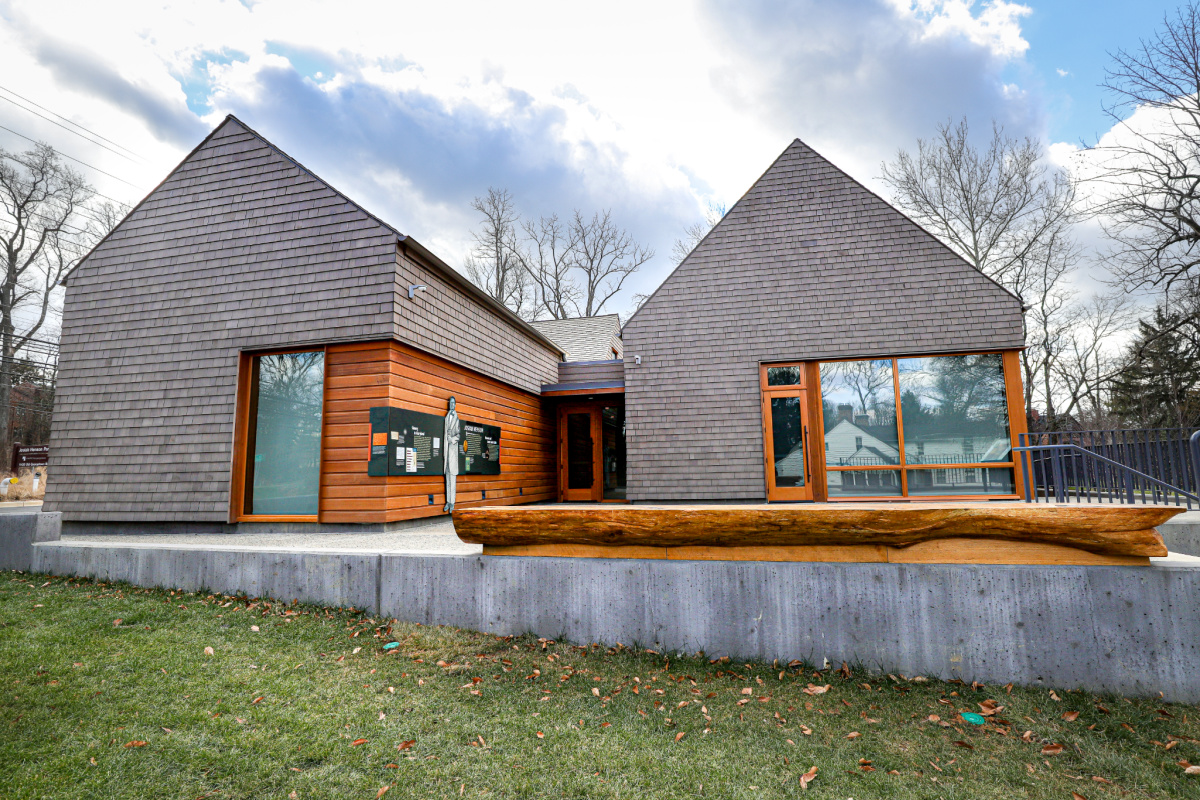
Tickets for Josiah Henson Museum and Park go on Sale Monday, 4/19/21
Tickets for the new Josiah Henson Museum and Park go on sale tomorrow (Monday) at 8 am on ActiveMONTGOMERY for the opening on Friday, April 23.
Buy your timed tickets online. Only advance tickets available (no walk-ups).
Per Montgomery Parks:
The Josiah Henson Park is a 3.34-acre park located at 11420 Old Georgetown Road in the Luxmanor Community of North Bethesda. The goal of the park project is to create a museum dedicated to telling the story of resilience and perseverance in overcoming slavery, based on the detailed words and experiences of Josiah Henson – enslaved in Montgomery County for much of his life. The project includes:
- The conversion of the historic Riley/Bolten House into a public museum
- The construction of a new 2,900 SF visitor center with a bus-drop off
- Additional parking on the former Rozier property
- The installation of exhibits that educate and interpret African American History in Montgomery County
- The exhibits will include a first-person narrative of Josiah Henson
Background
In June 2013, the Montgomery County Planning Board approved the Josiah Henson Park Facility Plan. The facility plan included the recommendation to rehabilitate Josiah Henson Park including the conversion of the historic house into a museum, the construction of a new orientation building, and a new site design that would make the park more accessible for visitors.
